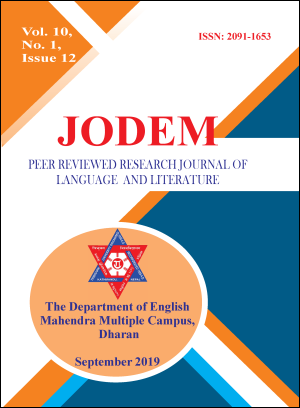Satire in Shrestha’s Ghintang Ghishi Twank
DOI:
https://doi.org/10.3126/jodem.v11i1.34808Keywords:
Absurdity, hypocrisy, mockery, subaltern, transformationAbstract
The objective of this article is to analyze the use of satire in three poems, from Rupesh Shrestha’s volume of poems Ghintang Ghishi Twank in order to examine use of the suffering of voiceless people. The poems depict absurdities of the society and hypocrisy of the leaders which are the causes of poor people‟s pains. This poems exhibit how follies, vices and absurdities are hurdle in transforming society into prosperous one. The poet has berated them with the aim of bringing positive change in the society and in the lives of the common people. The poet mocks at the political changes which have brought change only in the lives of political leaders, not in the lives of the people who have been ignored by the state for long. Despite many anxieties, they enjoy dancing and playing sticks in their hands on the special occasion of Gaijatra. The poems are collection of sharp words which are used to butt the corrupt politicians. For this, the elements of Juvenalian satire have been used as tools for analysis of the selected poems. This study highlights upon the anxieties of marginalized people; demonstrates the shameful act of politicians; and exposes the absurdities prevailed in the society. It indicates that the political and social absurdities are subject to be poked in order to reform a society.
Downloads
Downloads
Published
How to Cite
Issue
Section
License
© Department of English, Mahendra Multiple Campus, Dharan, Nepal

